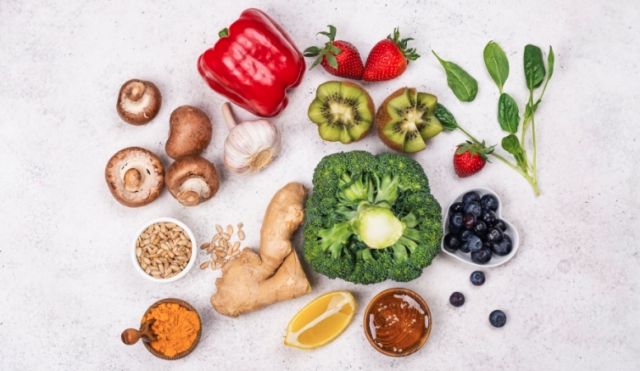Top 10 Fruits and Vegetables That Boost Your Immunity

Everyone is well aware that fruits and vegetables contain a wide range of nutrients that can strengthen the body’s defenses and help prevent the development of various diseases. However, when you go to the store, you often think about what is really worth putting in the basket.
Here are 10 of the healthiest fruits and vegetables that can boost your immune system.
grenades
The special chemical composition of the pomegranate provides many benefits: these fruits help prevent digestive problems, improve heart function, strengthen the blood, and prevent anemia. Pomegranates are rich in antioxidants that boost immunity and facilitate recovery from illness. The fruit is rich in vitamin C, vitamins B1, B6 and PP, as well as various minerals (calcium, iron and phosphorus). Garlic
Garlic once saved Europe from a plague, so it’s no surprise that this product is still held in such high esteem today. Garlic not only helps to strengthen the immune system, but also has anti-inflammatory and antimicrobial properties. They are recommended for sauces, meat dishes, salads and soups, but it is always best to add garlic towards the end of cooking to retain most of its beneficial properties.
Onion
Onions are one of those vegetables whose beneficial properties have been known since ancient times. These vegetables are rich in vitamins B and C, essential minerals (iron, potassium, calcium, manganese, magnesium, fluorine, phosphorus, and sulfur), flavonoids, and the plant hormone glucosinin, which helps naturally lower blood sugar levels. Onion activates metabolism, stimulates digestion, removes excess fluid and stimulates blood formation, so there is no shortage of reasons to include onions in your diet.
Tomatoes
The lycopene found in tomatoes is a unique natural remedy that helps protect against a wide range of diseases. If you eat tomatoes at least a couple of times a week, you can not only strengthen your immune system, but also reduce the risk of prostate, stomach and lung tumors. These vegetables are rich in vitamins A, C and K, folic acid, potassium, magnesium, phosphorus and copper, so eating tomatoes regularly every day will help you maintain good health.
Beet
Beetroot is a vegetable that nutritionists recommend eating at least 1-2 times a week. Interestingly, beets are the most beneficial for the body, as they absorb nutrients more easily. This is an excellent remedy for a lack of hemoglobin or a weakened immune system: these vegetables are rich in vitamin C, B vitamins and essential minerals such as iron, calcium, potassium and phosphorus.
Spinach
Only 30 grams of spinach contains several times more than the required daily intake of vitamin A, which makes it an indispensable vegetable for diseases of the mucous membranes, respiratory tract and intestines. Although this vegetable can be used in a variety of dishes, nutritionists recommend eating spinach raw: you can use it in salads or cold appetizers.
A pineapple
If you’re craving something sweet, try a fresh pineapple. Scientists claim that this fruit is useful not only for improving digestion, but also for its antioxidants, which strengthen the immune system and reduce the risk of cancer. Pineapples are also rich in the protein-breaking enzyme bromelain, which relieves pain, reduces inflammation, and eases expectoration. 100 grams of pineapple contains about 50 mg of vitamin C (more than half of the recommended daily allowance). They are also rich in potassium, magnesium and manganese, which are essential for bone health and glucose tolerance.
Pepper
Pepper is a low-calorie vegetable that is ideal for dietary nutrition. Just One Pepper Contains Your Full Recommended Daily Value of Vitamin C: If You Want To Boost Your Immunity, These Vegetables Are A Must! While it’s best to consume peppers raw, it’s interesting to note that most of the health benefits of peppers are retained when boiled or roasted. Pepper is recommended for people with cardiovascular disease, diabetes, dermatitis or anemia.
Sweet potato
Health experts say these vegetables are healthier than regular potatoes, and there are plenty of reasons to choose sweet potatoes: they boost immunity and have anti-inflammatory properties, the antioxidants in sweet potatoes help prevent free radical damage and reduce the risk of cancer, and improve digestion. and are an excellent source of vitamins A, B and C.
Carrot
The beta-carotene contained in carrots (it is what gives carrots their orange color) is an indispensable tool for strengthening the immune system. Health experts claim that beta-carotene not only helps prevent colds, but also improves heart health and lowers cholesterol levels. It’s no secret that eating carrots regularly can improve your eyesight, but it’s good to know that these vegetables may well reduce your risk of stroke and diabetes.